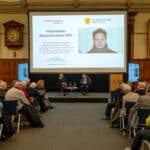2019 Geddes Lecture by David Aaronovitch now online
20 Apr 2019
As usual, the Geddes Memorial Lecture attracted such large interest that it had to be accommodated outside the College: the cavernous South Writing School in the Examination Schools provided the venue for this year’s event. Introductory addresses of welcome and thanks from the Principal and the Chair of the Geddes Trustees, Peter Cardwell, paved the way for David Aaronovitch to deliver a lively and engaging lecture on the subject ‘Do liberals need to use the media tactics of their opponents in order to win?’. The video of his lecture is now available to watch online on our YouTube channel.
David Aaronovitch, who is a journalist, broadcaster and author and writes for The Times, began by encouraging the audience to share his distaste for what he described as “the statistics of misperceptions” promoted by some sections of the media. He argued that such an approach to presenting news and shaping opinion was characteristic of a general move in Europe, and further afield, towards both populism and the Far Left being in opposition to Liberalism. He wanted to explore why moderates and liberals were apparently losing this media battle so badly.
Taking the UK’s 2016 EU referendum and the USA’s 2016 presidential election as examples, David suggested that in both cases the winning tactics involved exploiting voters’ emotions, for instance surrounding the issue of immigration, at the expense of providing the full facts and arguments based on these. In his view, the losing sides came to realise that the fact does not matter when people are trading in emotion or stimulating the electorate to react according to deep-seated values – and that such an approach is hard for liberalism to counter. Probing further, he argued that the way in which we absorb news nowadays too often involves the media reflecting our views back to us, and so reinforcing those views and hardening them into prejudices. Because it can be difficult to realise that this is happening, people do not question or resist.
The lecturer pointed out that in terms of media tactics, ‘good populism’ could be used to argue against ‘bad populism’ (as had happened in The Netherlands). But this opened up the danger of giving credibility to the arguments of ‘bad populism’ in the process of opposing them. The conundrum then created for liberalism was that attempted rebuttal starts to help your opponent more than you. Moreover, becoming intolerant of argument, using emotion to fight emotion, could, ironically, produce illiberalism – as seen when unhappy pro-Remainers scapegoated the BBC for its Brexit coverage and called for the broadcaster’s abolition.
David then discussed a number of countries in which populist governments had come into power in recent years but were discovering that their policies did not work because these were too simplistic. He did not detect, however, any acceptance that they should have heeded moderate, liberal arguments. He finished by conceding that he could offer no answers to the question which he had posed in the title of the lecture. But it was clear from the question-and-answer session and the warmth of the applause at the end that the audience had appreciated his wide-ranging exploration of the journalistic issues.
Related News

